Rodger "Fuzz" Young
The True Story of a Weekend Warrior
From the minutemen who purchased our Nation's freedom with their sacrifice during the American Revolution to the soldiers called to service during our current crisis, the defense of American freedom has often fallen to the citizen-soldier. Many of these were or are members of the National Guard and Reserves, men and women who live civilian lives Monday through Friday and commit at least one weekend each month to military training and preparedness.
When many Americans think of the members of the Guard and Reserves, they tend to define them as those citizens who are called out for temporary duty in times of floods, earthquakes, and other disasters...not as soldiers. Along the way, soldiers of the Guard and Reserves have often become known as Weekend Warriors, a title not ascribed in recognition of the potential dangers they face, but a cynical description that denies them the title they justly deserve...for they are true, American soldiers.
Since the beginning of the Spanish-American War, 114 members of the National Guard have been awarded Medals of Honor for their heroism in combat. This is the true story of one of them:
"On the island of New Georgia in the Solomons
"Stands a simple wooden cross alone to tell;
"That beneath the silent coral of the Solomons
"Sleeps a man, sleeps a man...
Remembered well."
Mr. and Mrs. Nicholas Young struggled bravely to contain their fears as they looked down at the unmoving body of their young son. For more than two hours the boy had lain motionless, the only sign of life and the one reason for hope, the fact that his chest rose and fell with his shallow breathing. Beyond this, there had been no signs of life since he had been carried from the floor of the high school basketball game. "Why," perhaps they wondered, "did their son have to try so hard." The skinny little guy was not an athlete, yet his passion for sports consumed him. By some twist of fate, his heart had been born too large for his body...or perhaps it was the other way around. The little guy just had too much heart to realize that there were some things his body couldn't do.
Rodger was one of Young's five children, four boys, and daughter Betty. The middle-class family made their home in Green Springs, Ohio only a few miles away from the slightly larger town of Tiffin where their son had been born fifteen years earlier on April 28, 1918. Rodger had always loved music, and years later his father recalled, "When Rodger was young, the whole family would play music together and people would stop and listen to us. Rodger was a very good musician. He played guitar and mouth organ." In fact, Rodger put together a family combo that became quite popular for neighborhood gatherings.
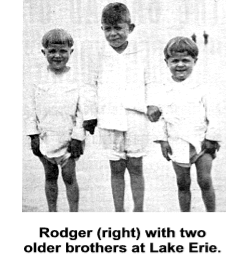 Rodger also loved the outdoors, despite a physique that would not have quickly identified him as the rugged, outdoor type. With Lake Erie only a short distance from his hometown, Rodger spent much of his free time fishing. He was also an excellent marksman and avid hunter. One day, while hunting rabbits, he had acquired the nickname Fuzz.
Rodger also loved the outdoors, despite a physique that would not have quickly identified him as the rugged, outdoor type. With Lake Erie only a short distance from his hometown, Rodger spent much of his free time fishing. He was also an excellent marksman and avid hunter. One day, while hunting rabbits, he had acquired the nickname Fuzz.
With so many things going for him, there was no logical reason for Fuzz to be so persistent in his determination to be an athlete. Baseball...well, he did reasonably well there and was known to have a strong throwing arm for such a little guy. When football season began during his Freshman year of high school, Rodger had been quickly eliminated from any competition as too small to compete. So, he eagerly awaited the start of the basketball season, determined somehow to make the team. He did...usually playing for practice scrimmages. But Rodger's spirit and determination also garnered the coach's respect, and occasionally he put the little guy into a real game.
A Scary Accident
Mr. and Mrs. Young looked back at the prostrate body of their little boy on his hospital bed, remembering how he had played every game as if he were the tallest guy on the court. The mere fact of his presence seemed to add a spark that ignited his less enthusiastic teammates. And then, only hours earlier, the little guy had been going up for a long shot when an opposing player fouled him, cutting his legs out from under him. Rodger had landed on the floor with a sickening thud, his head striking the hard surface creating an unearthly sound that had rendered the spectators silent. In the silence, all could see that Rodger Young was no longer moving...for him, the lights had finally gone out.
It was a heart-rending moment for Mr. and Mrs. Young, followed by anxious hours during which Rodger had been taken to the hospital, still unconscious. But Rodger was a kid with lots of heart, and as long as there was life, there was hope. A flicker of movement caught Mr. and Mrs. Young's attention and they looked quickly into the face of their son. A sparkle of light, reflected from the overhead lights, beamed back as one eye slowly opened. Then the other eye opened, and Rodger was back. Moments later his weak voice speaking reassuring words to his parents brought a flood of relief. The doctor came in, found Rodger now fully conscious and talking to his parents. He pronounced the young man recovered, and soon Rodger was on his way home to be rejoined with his brothers and sister.
Long-Term Effects
In the months that followed Rodger's basketball injury, Mr. and Mrs. Young's sense of relief at his recovery was beginning to look somewhat premature. Fuzz's fall to the hard floor had caused damage they couldn't have anticipated, nor could the medical equipment of the late 1930s detect. But through the following spring and summer, the damage done inside young Rodgers's body began to show itself more and more. His senses began to lose their keenness, his hearing worsening with each passing week. His eyes also began to fail, and soon he was wearing thick eyeglasses. In the fall he returned to high school, a Sophomore, but it was not destined to be a good year for Rodger Young. He had trouble hearing the lessons or seeing the drawings on the chalkboard. As a result, his grades began slipping, taking with them any hope of graduation. In the middle of the year, Rodger left high school. If he could not complete his studies successfully, he felt he might at least take a job in a local factory to help support the Young family. That was the way of Rodger Young, looking beyond his own inabilities or handicaps, with a concern for others. In 1939 Rodger and his older brother Webster joined the Ohio National Guard.
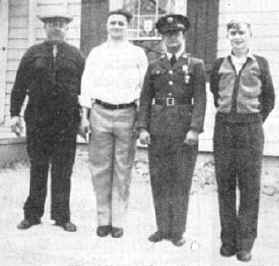 It was not so much a matter of patriotism that prompted the decision of the two boys, as it was a matter of practicality. The United States was at peace, the service in the guard was a simple matter of part-time soldiering that could provide a little extra income. By this time Rodger had resigned himself to the fact that his sight and hearing were growing increasingly worse, and the young man would probably never have passed a physical in the regular army. But in the National Guard, he found a welcome opportunity to serve, and to help support his family. The following year, his 148th Regiment was Federalized, and with the mobilization following the attack on Pearl Harbor, Rodger was a full-time soldier. At 5'2" tall and weighing 125 pounds, he was one of the smallest soldiers in the Army. Still, he wore his uniform with pride and was quick to pose for a photo with his father and two of his brothers on a return home.
It was not so much a matter of patriotism that prompted the decision of the two boys, as it was a matter of practicality. The United States was at peace, the service in the guard was a simple matter of part-time soldiering that could provide a little extra income. By this time Rodger had resigned himself to the fact that his sight and hearing were growing increasingly worse, and the young man would probably never have passed a physical in the regular army. But in the National Guard, he found a welcome opportunity to serve, and to help support his family. The following year, his 148th Regiment was Federalized, and with the mobilization following the attack on Pearl Harbor, Rodger was a full-time soldier. At 5'2" tall and weighing 125 pounds, he was one of the smallest soldiers in the Army. Still, he wore his uniform with pride and was quick to pose for a photo with his father and two of his brothers on a return home.
Becoming a Soldier
Despite his small size, his physical problems, and his thick glasses, Rodger managed to hide just how serious were his hearing and sight problems. He was a good soldier, training hard and with the same big heart that had always enabled him to achieve beyond what others might have expected, given his stature and appearance. In 1942 the 37th Infantry Division (Ohio National Guard) was sent to Camp Shelby, Mississippi to train for combat. Rodger and Webster went together, the older brother now married and renting an apartment near the post for his young wife.
As a young National Guard private, Rodger Young pushed himself to achieve in such a manner that his determination and enthusiasm could be seen by all. At Camp Shelby, that same drive pushed him to new levels, earning him the respect of all officers, NCOs, and the other enlisted men. One of the proudest moments in the life of Rodger Young was the day his dedication was recognized with a promotion. Three chevrons were pinned to the sleeves of Rodger Young's uniform, and the kid who was one of the most unlikely of soldiers was now a sergeant in the United States Army. Excitedly, he wrote home to share the wonderful news with his parents.
Rodger also developed a new hobby - photography. He loved taking pictures, his favorite subjects: "Pretty girls, scenery, buddies, and family." Weekends, he could be found still in uniform, leisurely and contentedly relaxing on the swing suspended from the porch of Webster's apartment. And there, the camera caught up with him, providing for those who would remember the smiling little guy with the big glasses, a most memorable portrait of the Army's proudest sergeant.
Heavy Losses in Southeast Pacific
While Rodger and Webster Young were training at Camp Shelby, the United States Marines launched the first major offensive in the Pacific at a small island named Guadalcanal. On the night of August 6, 1942, the men of the 1st Marine Division began arriving on the island that was pivotal to the Japanese control over the Solomon Islands. General Alexander Vandergrift and his untested Marines landed almost unopposed, only to find themselves in a 6-month battle for their lives. From August until October, heroism abounded, generating such legendary heroes as Manila John Basilone, Mitchell Paige, Joe Foss, Douglas Munro, Merritt Edson, and even the intrepid Marine commander himself. During the period the Marines fought bitterly, endured much, and suffered incredible losses.
Their valiant effort gained a small foothold on the island, however, and on Veterans Day 1942 the Army's 182d Infantry Regiment began landing to bring some relief to Vandergrift's Marines. The following night the Japanese responded in a naval battle in The Slot just beyond Guadalcanal that left several American warships burning or sinking. On the morning of November 13th, the USS Juneau was sunk by an enemy torpedo as the American vessel limped away from the scene of the previous night's engagement. Going down with the USS Juneau were the five Sullivan Brothers from a small town in Iowa, along with 7 other sets of brothers. None of the young sailors survived.
By February 1943, after heavy losses and continued bitter fighting, the American forces finally gained control of Guadalcanal. A few months later the 37th Infantry Division departed San Francisco for Guadalcanal, the fresh troops being prepared to continue the effort to wrest control of the Solomon Islands from the Japanese. Among the young soldiers of the Ohio National Guard departing the shores of their homeland for combat in the Pacific, was a small-built, be-speckled young man named Staff Sergeant Rodger Young.
The SS President Coolidge transported these fresh troops, most of which were former Ohio National Guardsmen, first to Fiji. From there the 37th Infantry moved on to Guadalcanal, now firmly under American control and a training and staging area for planned assaults throughout the Solomons. Upon arrival on Guadalcanal, the soldiers began additional training to prepare themselves for war in the jungles. Staff Sergeant Young pushed his soldiers with great dedication, fully understanding that within weeks their survival in combat would be decided in large measure by their preparations for war. In those preparations, Staff Sergeant Young developed the confidence in his soldiers that they could meet the enemy and defeat him...that they were at last ready for war. It was during this period that the young NCO from Ohio also began to realize that perhaps he was not!
A Tough Choice
From his earliest childhood, Rodger Young's heart had always been much larger than his body...his determination far stronger than any perceived weakness. Now, for the first time, Rodger Young realized that he had to come to grips with some of his own limitations. He had been proud of his accomplishments, his yellow sergeant stripes among his most cherished achievements. But preparing his soldiers for war brought a realization that he must make the most difficult decision of his life. He did and in typical Rodger Young fashion.
It was late in June when Staff Sergeant Young went to see the 148th's Regimental Commander, drawing himself up to his full 5'2" height to render a salute, the chevrons of a Staff Sergeant prominent on his sleeves. Plans were underway for sending the 148th into combat on the nearby island of New Georgia to take and hold the vital Munda airstrip. The planning was intense, and the C.O. was at first rather preoccupied when the little guy with the thick glasses said: "Sir, I would like to request permission to be reduced to the rank of private."
It was an unusual statement from an NCO and caught the commander rather unprepared. After a moment he looked at the young man before him and asked rather brusquely, "What is your reason for wanting to be busted, Sergeant?" Sergeant Young steeled himself for what he knew he must do. He loved his stripes, his role as a leader, and the fact that he had accomplished so much despite his size and his failing health. Choking back his emotions he blurted out, "Well, sir.... you see...my ears are going bad. I can't hear very well anymore and I don't want any of my men killed in New Georgia because of me."
It had been a tough decision, but he knew it was the right decision. He had forced himself to come here now, to face his commander, and admit to his own frailty. It was perhaps, the most difficult thing he had ever done in his life. Now he was stunned and angered when the commander replied rather curtly and with some distaste, "What's the matter Sergeant? Don't you want to fight?" The response cut into him deeply...the decision he had struggled with for so long and finally forced himself to make, was being misinterpreted as cowardice! His commander thought he was trying to fabricate medical problems to get himself shipped home and away from the looming combat action on New Georgia. "Sir," Rodger Young replied resolutely, "I don't want to leave the outfit. I want to go on -- but as a private, so I'm only responsible for myself. I don't want to get any of my men hurt because of me." He paused for a moment, looking the senior officer full in the eyes and continued, "If I thought I'd be left behind because of this, then I'd rather drop the whole thing."
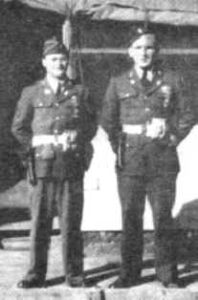 The captain even tendered the brave young man an apology with the doctor's recommendation that he be sent to a field hospital. Sergeant Young emphatically refused to be sent away and returned to his unit to join his friends. There was no way he would leave them now. They had been together far too long, most of them from his home state and some from his small hometown, such as his boyhood friend fellow NCO, Sergeant Walter Rigby (in the photo on right with Rodger Young).
The captain even tendered the brave young man an apology with the doctor's recommendation that he be sent to a field hospital. Sergeant Young emphatically refused to be sent away and returned to his unit to join his friends. There was no way he would leave them now. They had been together far too long, most of them from his home state and some from his small hometown, such as his boyhood friend fellow NCO, Sergeant Walter Rigby (in the photo on right with Rodger Young).
Sergeant Rigby would retain his stripes in the coming action, but on the following morning Staff, Sergeant Rodger Young was reduced to the rank of private. Ironically, he would serve under Sergeant Rigby in the coming action...one that would demand an even tougher, and far more costly decision, than his decision to give up his cherished chevrons. The Ohio National Guard was on its way to the island of New Georgia, just 200 miles from Henderson Field at Guadalcanal, to claim an airstrip of their own...

Operation Cartwheel
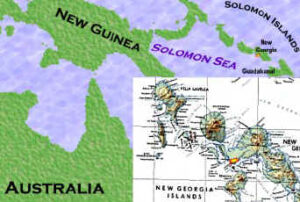 Operation Cartwheel was a plan hammered out in April 1943 by General Douglas MacArthur and Admiral William Halsey, a strategy to topple Japanese control of the South Pacific. Its' ultimate objective was the Japanese garrison at Rabaul. To smash the large enemy force there, MacArthur's troops would battle their way across the large island of New Guinea while Halsey's forces would continue a northwesterly advance across the Solomon chain.
Operation Cartwheel was a plan hammered out in April 1943 by General Douglas MacArthur and Admiral William Halsey, a strategy to topple Japanese control of the South Pacific. Its' ultimate objective was the Japanese garrison at Rabaul. To smash the large enemy force there, MacArthur's troops would battle their way across the large island of New Guinea while Halsey's forces would continue a northwesterly advance across the Solomon chain.
Halsey's strategy was to begin an island-hopping assault, moving northwest out of Guadalcanal across the islands of New Georgia, Kolombargara, and on to Bougainville, which would put his forces within 200 miles of Rabaul. On June 30th he began landing the first of his ground forces, soldiers of the New England National Guard (43rd Infantry) on the island of New Georgia. For two weeks they slugged their way across mountainous jungle, enduring the tropical extremes in both climate and geography, all the while battling a fierce, well-entrenched, and often hidden enemy. The prize would be the Munda airstrip on the western coast of the island. If the American forces could take and hold the Munda airstrip, they would have an airfield 200 miles closer to their ultimate objectives than Henderson field at Guadalcanal.
The Japanese commander on New Georgia was Major General Nabor Sasaki, and he took every step available to defend his airfield. Fortifications were dug into the ground, reinforced with logs hewn from the jungle, and carefully camouflaged to allow the advancing Americans to advance nearly upon the positions before his soldiers turned their machineguns loose. At night his seasoned Japanese soldiers would creep into American positions, killing quickly and silently, and waging a very effective battle on the psyche of the green young combat troops from the United States. It was an effective tactic that preserved his hold on the Munda airstrip and demoralized the American soldiers.
Two weeks into the campaign, Admiral Halsey committed two more divisions to the island in effort to shore up the faltering men of the 43rd Infantry and reinforce the battle for the Munda Airstrip. In addition to the 25th Infantry Division, the men of the 37th Infantry Division were landed at New Georgia. Private Rodger Young's 148th Regiment, young men of the Ohio National Guard, were about to receive their baptism of fire. Also landing with the 37th was the 145th Regiment.
By July 27th, the 37th Infantry had battled its way to the foot of Horseshoe Hill, a well-fortified position overlooking the main inland approach to the airstrip. As machinegun fire and enemy mortars rained down on the American soldiers from the enemy positions above, casualties began to mount. Private First-Class Frank Petrarca, a National Guardsman from Cleveland, Ohio could hear calls of "medic" all around him. His forward patrol had moved within 100 yards of the enemy position before the devastating enemy fire ripped heavily into them. Quickly the young medic did his best to treat the most seriously wounded. One of them was Private First-Class Scott, his body so badly battered that he could not even be moved--despite the fact he was laying within 75 yards of the enemy position. 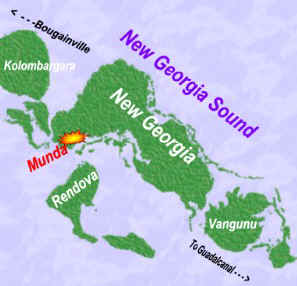 Heedless of the rain of mortars and machinegun bullets, PFC Petrarca did his best to treat PFC Scott and two other wounded Americans nearby. As mortar fire erupted closer to their tenuous position, Petrarca used his own body to shield the wounded Scott, remaining with him until he finally died of his wounds.
Heedless of the rain of mortars and machinegun bullets, PFC Petrarca did his best to treat PFC Scott and two other wounded Americans nearby. As mortar fire erupted closer to their tenuous position, Petrarca used his own body to shield the wounded Scott, remaining with him until he finally died of his wounds.
Throughout the following day, American units continued to deploy in small platoons at strategic locations along with the approaches to the Munda Airstrip. The heavy combat had left much of the ground desolate, the hidden enemy positions scattered in such a way that advances were usually made in platoon or squad-size elements.
Frustration was high among the embattled young American soldiers, many suffering from battle fatigue. Morale was falling as heavily as the daily rains that soaked their uniforms and flooded their positions, and the Japanese continued to snipe at them from hidden positions during the day, and probe their encampments during the night. On July 29th First Lieutenant Robert Sheldon Scott of Santa Fe, NM was leading his platoon in the lead of a company assault on the enemy positions.
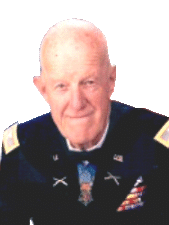 Advancing up a hill overlooking the airstrip, Scott's platoon moved within 75 yards of the hidden Japanese position, when the enemy counter-attacked. Swarming out of their bunkers and foxholes, throwing grenades, and firing in volleys, the Japanese soldiers overwhelmed Lieutenant Scott's small platoon, forcing them to quickly pull back...all but the intrepid lieutenant.
Advancing up a hill overlooking the airstrip, Scott's platoon moved within 75 yards of the hidden Japanese position, when the enemy counter-attacked. Swarming out of their bunkers and foxholes, throwing grenades, and firing in volleys, the Japanese soldiers overwhelmed Lieutenant Scott's small platoon, forcing them to quickly pull back...all but the intrepid lieutenant.
Ducking behind the blasted remains of a tree stump, Lieutenant Scott stood his ground against the enemy assault. Firing his carbine and throwing grenades, alone he turned back the wave of enemy soldiers. In the brief lull that followed he replenished his supply of grenades, then continued to hide behind the meager shelter of his blasted-out tree stump. From his vantage point, he had a good view of the enemy bunkers. He continued to fire on them until an enemy round struck his carbine. A shrapnel round opened the flesh on his head, but he refused to leave his position behind the stump. A wound to his left hand didn't inhibit him from continuing to throw grenades with his right, his accuracy destroying enemy bunkers and positions one after another. Watching from a distance, the rest of his company was amazed and inspired the lieutenant's one-man stand and rushed forward, taking the hill. When they did, they found that the intrepid young officer had thrown nearly three dozen grenades, and a total of 28 Japanese bodies were counted in the bunkers he had destroyed.
His battle won, the wounded and weary officer finally rose from the shelter of his small stump to join his victorious company. It was amazing, not only what he had done, but how he had accomplished it from the small protection of a skinny tree stump, shattered in half only a few feet above the ground. Lieutenant Robert Scott was no little guy, like Rodger Young, who would be well concealed behind a small tree stump. At 6'5" tall, Lieutenant Robert Scott was one of the tallest men to ever be awarded the Medal of Honor.
Advances and small victories such as the one achieved on Robert Scott's hill overlooking the airstrip continued the following day. Slowly the Americans were gaining ground and were not within 1,000 yards of their objective. On the last day of July, small platoons of American soldiers all around Munda continued to move forward. The desperate Japanese, determined to fight to the last man, furiously resisted every advance. Only 20 yards from the Japanese lines, two soldiers of the old Ohio National Guard huddled in a muddy foxhole as the mortar fire rained around them. Suddenly one of them struck close enough for the shrapnel to reach their sheltered position. A short distance away, PFC Frank Petrarca heard the cries of the wounded.
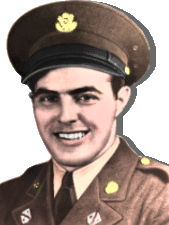 Grabbing his aid bag, he prepared to go to their rescue. One of the soldiers in his platoon grabbed his arm and urged him to remain where he was. In order to reach the wounded, he would have to move over a barren hilltop, fully exposed to the enemy. From a distance of 20 yards, he would be an easy target. PFC Petrarca shook off his comrade's warning. There were wounded Americans, and he was their medic. He had a job to do.
Grabbing his aid bag, he prepared to go to their rescue. One of the soldiers in his platoon grabbed his arm and urged him to remain where he was. In order to reach the wounded, he would have to move over a barren hilltop, fully exposed to the enemy. From a distance of 20 yards, he would be an easy target. PFC Petrarca shook off his comrade's warning. There were wounded Americans, and he was their medic. He had a job to do.
Amazingly, considering the hail of fire directed his way, the fearless medic managed to move within two yards of the wounded men when a mortar round fell at his feet. The words of his subsequent Medal of Honor citation state, "Even on the threshold of death, he continued to display valor and contempt for the foe; raising himself to his knees, this intrepid soldier shouted defiance at the enemy, made a last attempt to reach his wounded comrade and fell in glorious death." The date was July 31, 1943. It was PFC Frank Joseph Petrarca's 25th birthday.
A short distance away from the place where a young medic named Petrarca was dying, the 148th Infantry Regiment was making a sweep along the north flank of the Japanese fortifications. A 20-man patrol was sent out under a lieutenant and Platoon Sergeant Walter Rigby early in the morning, working its way along a seemingly deserted trail that was heavily overgrown. The patrol was well into the enemy-held area, perhaps as much as a mile forward of the rest of the American force. Among the young enlisted men who followed Sergeant Rigby deeper and deeper into the fortress of the enemy was his boyhood friend, Private Rodger Young.
It was nearing 4:00 in the afternoon when the lieutenant began withdrawing his platoon, hoping to return to the Company B bivouac area before darkness set in. As the patrol moved silently down the trail, high above them five Japanese soldiers monitored their movement from a well-concealed machinegun nest. The well-placed enemy position gave the Japanese a commanding view of the trail, and they held their fire until the patrol was well into the open and only a short distance in front of the muzzle of their guns. Then they opened fire. Two soldiers fell dead in the initial volley, as the remaining eighteen men dug frantically for cover. Above them the enemy soldiers held down the trigger of their machinegun, pouring unrelenting death on Sergeant Rigby and his men.
The lieutenant attempted a mass maneuver to remove his men from danger. It was an utter failure, and two more Americans fell to the deadly fire. All the sixteen survivors could do was press their bodies to the earth and pray. They were trapped from above, unable to move, and darkness would set in before long. "We didn't know how we were going to get out - we were surrounded by the Japanese," Private William Ridenour later recalled. "We were all in a semi-circle, and we lit up our ammunition. We had to burn it up. That's one of the lessons you learn, not to leave any ammunition for the enemy to use on you." Sergeant Rigby did his best to rally his men, but it was heart-rending. "We (had) walked right into a trap," he remembered. In the opening moments, four young men from his hometown area had fallen. Unlike the regular Army, when a National Guard unit goes into war, a company or a platoon is often heavily made up of a group of young men who all come from the same city or region.
As the young NCO struggled to carry out his orders: "We had been ordered to burn our rations when we were told to withdraw," he noticed movement from another of his hometown soldiers. It was his boyhood friend, Private Rodger Young. "Rodger was bound and determined to get that Japanese machine gun. In his position, he had to know he was going to get killed. When I gave the order to retreat, I saw one of the boys beside him poke him with a stick and tell him to draw back but he had his sight on that pillbox and started after it."
Inching forward, his rifle cradled in his arms, the young private with the thick glasses had come to another of those tough choices in his life. As he slithered past the lieutenant, the officer reached out to try and stop him by grabbing his leg. Roger shook himself free and pushed on. The Japanese saw the flicker of movement and loosed a volley of fire in that direction, one round singing the lieutenant's hand and causing him to pull it back. Rodger Young continued crawling forward. "Come back here!" The Lieutenant shouted. "It's suicide." The young private ignored the lieutenant's concern. If someone didn't knock out that enemy gun, the entire patrol would probably die. "Come back Private Young....that's an order!" The lieutenant shouted again. For a moment the young private paused, turned to look back at his lieutenant....and smiled. "I'm sorry sir," he said. Then he smiled again. "You know sir, I don't hear very well." And then Rodger Young turned away from his lieutenant to continue crawling forward.
From their vantage point, the enemy could see the movement of the grass as the American soldier crawled towards them, and unleashed the full fury of their machinegun. The other 15 men of Young's patrol returned fire, hoping to keep the enemy gunners pinned down as their friend and comrade continued his intrepid advance.
A sudden blow struck Private Young in the shoulder, rendering his left arm useless. The same round shattered the stock of his rifle, and he left it along with the trail of blood that marked his painful progress as he continued to crawl determinedly forward. Miraculously he was getting closer to his goal when another stream of enemy fire raked the left side of his body from thigh to ankle. "Stay where you are," the lieutenant shouted above the din of battle. "We'll get you out somehow!" Rodger just shook his head.
The pain must have been unbearable, but it couldn't deter him. As always, Rodger Young had more heart than the body, and today his heart would carry him. Five yards from the enemy position, Rodger Young had dropped his shattered body into a depression in the ground deep enough to place him below the muzzle of the machinegun. Slowly, painfully, he used his good right hand to reach down and pull a grenade from his belt and raise it to his face. With his teeth, he pulled the safety ring, released the lever and rose to his feet. Fifteen feet directly in front of the machinegun, there was no hope for the young man from Green Springs, Ohio. The full force of the automatic weapon caught him full in the face. But Rodger Young, even in death, had more heart than the body. As his thick glasses imploded upon his young face, and moments before his 5'2" body slumped to the ground, he mustered the strength to throw the grenade. It was a throw that would have made any athlete proud, strong, and true...destroying the enemy position and saving the lives of his comrades, including his boyhood friend, Sergeant Rigby.
It was after nightfall when the fifteen survivors of Sergeant Rigby's patrol finally reached the Company B bivouac area. Between them, they carried a heavy burden wrapped in ponchos, the bodies of five hometown boys of the Ohio National Guard. The company commander sat down and wrote letters home to the mothers of five young Americans who had given everything they had in the defense of freedom. That completed, he began writing a special report on one of them. It was the recommendation for the Medal of Honor, to be awarded posthumously to Private Rodger Young. In the recommendation he included the sentence, "Disregarding the orders of his platoon leader to come back, Rodger Young moved forward into the face of enemy fire." The commander of the 148th Regiment reviewed the recommendation and approved it with one minor change. He altered the previous sentence to say, "Not hearing the orders of his platoon leader to come back, Rodger Young moved forward into the face of enemy fire. "No one in his regiment disobeyed orders.
A month after the captain sent his letter of condolences to Mr. and Mrs. Nicholas Young regarding the death of their son, he received a courteous but interesting reply. Mrs. Young thanked the commander for his kind letter, and included a special request:
"Rodger was proud of being a staff sergeant. Since his body won't be returned to us until after the War, we would like to put up a little monument in our Clyde, Ohio, cemetery. Would it be permissible to write 'Staff Sgt. Rodger Young' on the tombstone?"
The captain was more than happy to submit Mrs. Young's personal request through channels in an effort to get Rodger Young posthumously promoted back to Staff Sergeant. Incredibly, his request was denied. Such action was without precedent, and the Department of the Army cited any number of regulations prohibiting Mrs. Young's request. Angry, but unable to do anything further, the captain finally wrote back to Mrs. Young to inform her that "for the time being, your wonderful son will have to remain a private."
Six months later, on January 17, 1944, at Fort Knox, Kentucky; Major General Charles Scott presented the family of Army Private Rodger Wilton Young with our Nation's highest award for military valor. Fuzz, the "Weekend Warrior" from Ohio, had proven himself to be one of our country's truest kinds of heroes.
Footnote:
During World War, I, fighting men abroad and worried families at home were inspired and motivated by the musical compositions of George M. Cohan. During World War II, the United States Army was eager to revive such patriotic music and was eager to find a song that could become a somewhat official theme song for the men of the Army infantry.
Among the ranks of America's soldiers was a 34-year old composer from New York, Private First-Class Frank Loesser. It was he who was asked to compose this new Army theme song by the US War Department. It was suggested that PFC Loesser read the Medal of Honor citations of Army Infantry heroes for inspiration and material. It was also specifically requested that he review only the citations of Army privates. The new song would not be dedicated to officers or NCOs but would recognize the everyday soldier, the lowly private who laid it all on the line in the fields of battle.
It only took one reading of Private Rodger Young's Medal of Honor citation to convince Loesser that he had found his subject and his source of inspiration. The Ballad of Rodger Young did indeed, become one of the most recognized hits of World War II. Ironically, has Mrs. Young's request to have her son posthumously promoted back to Staff Sergeant been approved, the story of Rodger Young would not have been reviewed by PFC Loesser, and one of the most memorable ballads of American history would have never been written. The Ballad of Rodger Young by PFC Frank Loesser:
No, they've got no time for glory in the Infantry.
No, they've got no use for praises loudly sung,
But in every soldier's heart in all the Infantry
Shines the name, shines the name of Rodger Young.
Shines the name--Rodger Young!
Fought and died for the men he marched among.
To the everlasting glory of the Infantry
Lives the story of Private Rodger Young.
Caught in ambush lay a company of riflemen--
Just grenades against machine guns in the gloom-
Caught in ambush till this one of twenty riflemen
Volunteered, volunteered to meet his doom.
Volunteered, Rodger Young!
Fought and died for the men he marched among.
In the everlasting annals of the Infantry
Glows the last deed of Private Rodger Young.
It was he who drew the fire of the enemy
That a company of men might live to fight;
And before the deadly fire of the enemy
Stood the man, stood the man we hail tonight.
On the island of New Georgia in the Solomons,
Stands a simple wooden cross alone to tell
That beneath the silent coral of the Solomons,
Sleeps a man, sleeps a man remembered well.
Sleeps a man, Rodger Young,
Fought and died for the men he marched among.
In the everlasting spirit of the Infantry
Breathes the spirit of Private Rodger Young.
No, they've got no time for glory in the Infantry,
No, they've got no use for praises loudly sung,
But in every soldier's heart in all the Infantry
Shines the name, shines the name of Rodger Young.
Shines the name--Rodger Young!
Fought and died for the men he marched among.
To the everlasting glory of the Infantry
Lives the story of Private Rodger Young.
About the Author
Jim Fausone is a partner with Legal Help For Veterans, PLLC, with over twenty years of experience helping veterans apply for service-connected disability benefits and starting their claims, appealing VA decisions, and filing claims for an increased disability rating so veterans can receive a higher level of benefits.
If you were denied service connection or benefits for any service-connected disease, our firm can help. We can also put you and your family in touch with other critical resources to ensure you receive the treatment you deserve.
Give us a call at (800) 693-4800 or visit us online at www.LegalHelpForVeterans.com.
This electronic book is available for free download and printing from www.homeofheroes.com. You may print and distribute in quantity for all non-profit, and educational purposes.
Copyright © 2018 by Legal Help for Veterans, PLLC
ALL RIGHTS RESERVED

